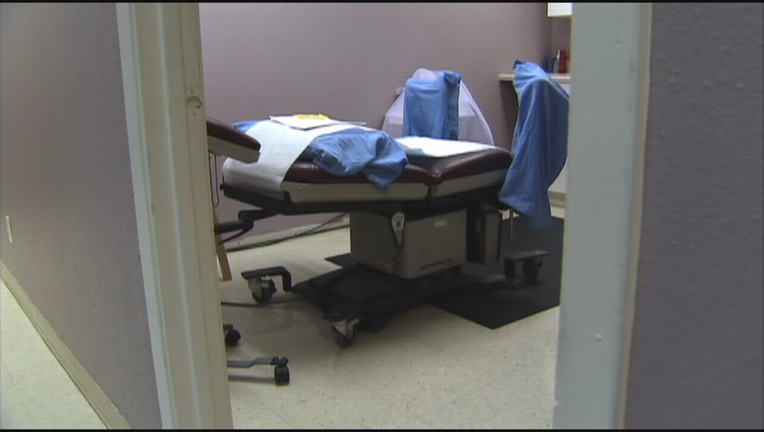Preview of ‘a post-Roe world’ in Texas over abortion access

AUSTIN - Texas offers a glimpse in real time of what would be a striking new national landscape if the Supreme Court drastically curtails abortion rights: GOP-led states allowing almost no access to abortion, and women traveling hundreds of miles to end their pregnancies.
No longer a distant prospect, both sides of the ever-contentious abortion debate are actively preparing for life after Roe v. Wade.
What will happen if the Supreme Court uses its pending case from Mississippi to undo a nationwide right to an abortion that has been in place since 1973? Texas has been there for three months.
On Sept. 1, a state law took effect banning abortion at roughly six weeks, before some women even know they are pregnant. And so far, the Supreme Court has declined to block it — showing no urgency as it allows the nation’s most restrictive abortion law in more than 50 years to stay on the books.
"What we’ve experienced the past three months in Texas is a preview of a post-Roe world," said John Seago, legislative director of Texas Right to Life, the state’s largest anti-abortion group.
"You will have conservative states that take very bold pro-life laws to protect pregnant women and innocent children from abortion. And then you have states that become destination states where people are traveling."
Featured
The Breakdown: SCOTUS hears abortion argument
If Roe v. Wade is overturned, it's likely at least 22 states would immediately move to ban abortion.
For Texas women, those destinations since September have included not only neighboring Oklahoma and Louisiana — states where GOP lawmakers could also move to further restrict abortion depending on the forthcoming opinion by the Supreme Court — but as far as away as the West and East coasts, according to abortion providers and their allies. Some Texas providers say patient volume at their clinics has plummeted to just a third of the usual levels.
During nearly two hours of arguments Wednesday, all six conservative Supreme Court justices indicated they would uphold Mississippi’s law that bans abortion after 15 weeks. It will be months before a decision is issued. Several indicated Roe itself is in jeopardy.
Amy Hagstrom Miller, president of Whole Woman’s Health that operates four clinics in Texas, heard few signs of encouragement while listening to the justices. She said she has already been doing "post-Roe planning" for several years, including maps in her office that show what travel will look like for women in states with Texas-style restrictions.
For now, her Texas clinics are seeing only 20-30% of the number of patients they served this time a year ago. Her Dallas clinic is less busy because it is closer to neighboring states with less restrictive abortion laws. Farther south, at her clinic along the U.S.-Mexico border, patients are "desperately trying to get in as fast as they can," including some who do not yet know they are pregnant.
Others who arrive are told they are too far along to end their pregnancies under the Texas law.
"We’re still seeing them kind of frozen and shocked in a way, and not necessarily kicking right into an action plan about what’s next," Hagstrom Miller said. "That sort of surprised some of us. You know, we thought maybe we would be put in the position of making a referral and trying to facilitate what’s next for them. But I think folks are just stunned."
Complicating matters for Texas providers is another new restriction that took effect Thursday, which makes it a crime to send abortion-inducing medication through the mail and bans it after seven weeks of pregnancy. Hagstrom Miller said 65% of her patients choose medication abortions, which have increased in popularity since regulators started allowing them two decades ago.
The Biden administration and Texas providers sued over Texas’ near-ban on abortion, but the Supreme Court’s pace on that has surprised both sides.

SCOTUS hears Texas abortion arguments
It's been two months since the strictest abortion law in the country was allowed to take effect in Texas and already it's faced non-stop legal challenges.
The court raised expectations it would move very quickly when it agreed to hear the cases on an expedited schedule that has been reserved for some of the most consequential cases in its history. Those include Bush v. Gore after the 2000 election, the Pentagon Papers and the Watergate tapes, which all were heard and decided within days or weeks, not months.
DOWNLOAD THE FOX 26 NEWS APP FOR THE LATEST ALERTS
As far as the Texas law goes, the way it is written has so far made it unusually difficult to challenge in courts. The question the justices are considering is whether the Justice Department and abortion providers can even challenge the law in federal court.
It’s impossible to say where things stand inside the Supreme Court, where the justices typically exchange and revise opinions privately on both sides before handing down a decision.
With no action so far, it seems clear that the court lacks five votes, a majority of the nine-member body, to put the Texas law on hold.
When abortion providers asked the court to keep the law from taking effect, the justices refused by a 5-4 vote, with Chief Justice John Roberts joining his three liberal colleagues in dissent.
Dr. Bhavik Kumar, a staff physician at Planned Parenthood in Houston, estimated that the number of patients it has served since the Texas law took effect has been cut by 30-50%.
Clinics in neighboring states, he said, are experiencing scheduling backlogs of patients coming from Texas. And that doesn’t account for pregnant women who are simply too poor to afford a trip to another state.
"Thinking about the states where they may travel to, we know that they simply cannot absorb the volume of patients that need care," he said. "It’s very scary to think about how we will provide care."


